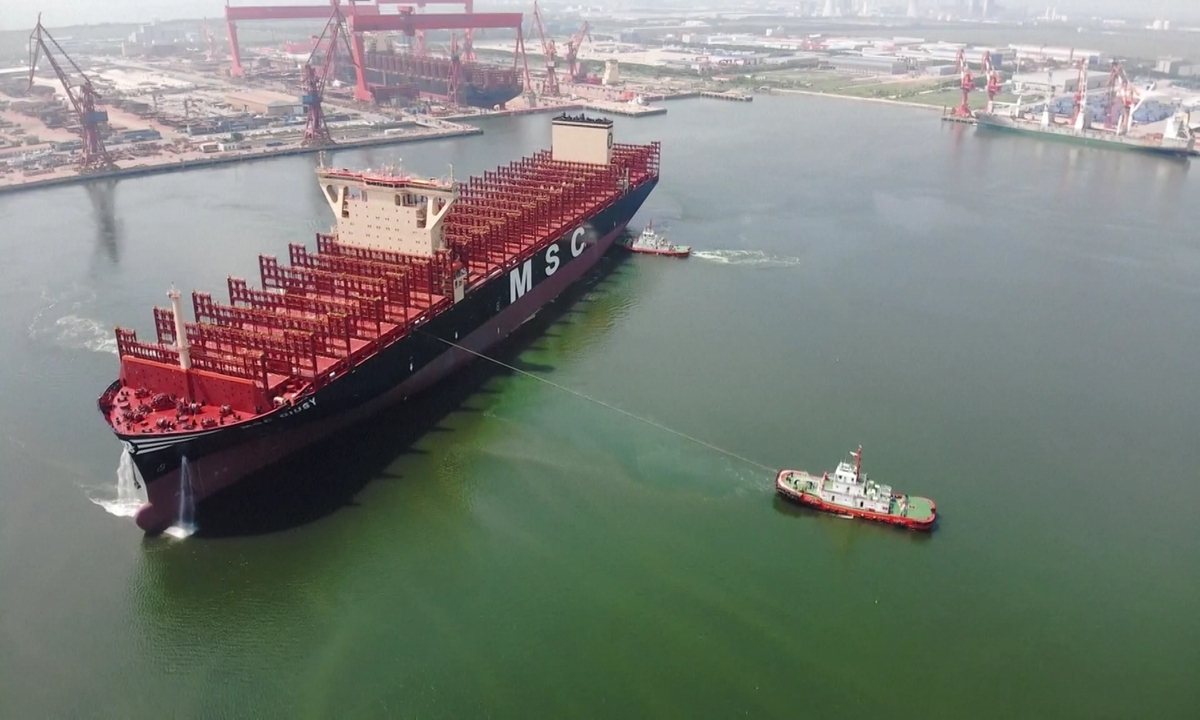
A shipyard under the China State Shipbuilding Corp delivers a large container ship from its base in North China's Tianjin Municipality on September 27, 2023. Photo: VCG
Despite challenges posed by Washington's increasing protectionism, China's shipbuilding industry has already established a strong foundation for sustainable growth. This suggests that, despite obstacles and competition, the growth momentum of Chinese manufacturing will not be fundamentally hindered.
China CSSC Holdings Ltd's first-half net profit is expected to soar between 144 percent and 171 percent from the same period last year to between 1.35 billion yuan ($185.6 million) and 1.5 billion yuan, the Shanghai-based company said in a statement on Monday.
The shipbuilding giant's 2024 first-half results are undoubtedly encouraging, showcasing not only the company's strength but also the competitiveness of the Chinese shipbuilding industry overall.
In recent years, China's shipbuilding industry has seen a significant increase in competitiveness, mainly driven by various aspects of the comprehensive progress and development of the industry.
In the first five months of this year, China's shipbuilding output reached 16.47 million deadweight tons (dwt), up 15.4 percent year-on-year, accounting for 48.1 percent of the global total, according to the China Association of the National Shipbuilding Industry. New orders in China's shipbuilding sector surged 49.5 percent from a year earlier to total 26.45 million dwt, taking up a 67.3 percent share of the global total.
Furthermore, the remarkable growth of the Chinese shipbuilding industry is particularly noteworthy in light of the current US Section 301 investigation into China's shipbuilding sector and the increasing trade protectionism from Washington. This growth not only underscores the resilience and adaptability of Chinese shipbuilding companies in the face of external challenges but also demonstrates the insufficient global high-tech shipbuilding capacity due to the structural change on the demand side.
While the measures taken by the US, such as imposing docking fees, may increase the maritime costs of some goods, observers generally believe the Section 301 investigation won't shake China's leading position in the global shipbuilding sector. This is because the competitiveness of China's shipbuilding industry is the result of a combination of factors, which cannot be contained simply by means such as tariffs.
Technological progress, economies of scale, a complete industrial chain, and a sensitive response to market demand are all crucial factors in enhancing the competitiveness of China's shipbuilding industry.
The global maritime market is currently witnessing a significant increase in demand for fleet renewals, while the uptick in freight rates resulting from various global economic and political factors has also led to a notable rise in new orders for shipbuilding. It is important to note that the current demand for orders is primarily focused on large vessels with advanced technology requirements, but the global production capacity for such high-tech ship types is woefully inadequate.
China is one of the few countries in the world with both advanced technology and large-scale shipbuilding capacity. The scale economy has given Chinese shipbuilders a competitive edge in cost control and production efficiency. Moreover, China's leading shipbuilders are gradually upgrading their production capacity to high-tech ship types to meet the shift in market demand. This combination of technology and capacity is the bedrock of China's booming shipbuilding industry, which the US will find difficult to contain.
The shipbuilding industry is a key player in China's national economy, on par with the automobile manufacturing industry. The ongoing growth and success of the Chinese shipbuilding sector underscore the irreplaceable nature of Chinese manufacturing in the global market. China's manufacturing prowess lies in its product quality and service excellence, rather than unfair competitive advantages.
China's manufacturing sector has demonstrated remarkable resilience in the face of protectionist challenges. Over the years, industries such as steel, home appliances, solar power, and wind power have continued to thrive and expand despite facing various obstacles. Similarly, the shipbuilding industry won't be deterred by challenges. Chinese shipbuilding companies will tackle competition and obstacles in the global market with ongoing technological innovation and market expansion, proving again the resilience of the Chinese manufacturing industry in overcoming external containment and achieving sustainable growth.




